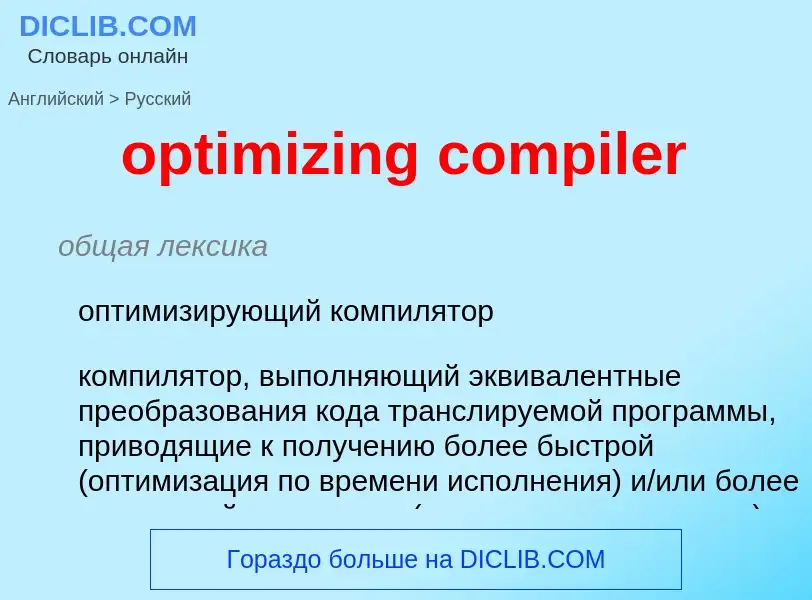Tradução e análise de palavras por inteligência artificial ChatGPT
Nesta página você pode obter uma análise detalhada de uma palavra ou frase, produzida usando a melhor tecnologia de inteligência artificial até o momento:
- como a palavra é usada
- frequência de uso
- é usado com mais frequência na fala oral ou escrita
- opções de tradução de palavras
- exemplos de uso (várias frases com tradução)
- etimologia
optimizing compiler - tradução para Inglês
общая лексика
оптимизирующий компилятор
компилятор, выполняющий эквивалентные преобразования кода транслируемой программы, приводящие к получению более быстрой (оптимизация по времени исполнения) и/или более компактной программы (оптимизация по памяти). Оптимизация включает однократное вычисление общих подвыражений, вынос из цикла не зависящих от повторений операций, уничтожение лишних присваиваний, проверок и другие преобразования
Смотрите также
общая лексика
компиляция
компилирование
составление
формирование
вычислительная техника
трансляция
транслирование
Definição
Wikipédia
In computing, an optimizing compiler is a compiler that tries to minimize or maximize some attributes of an executable computer program. Common requirements are to minimize a program's execution time, memory footprint, storage size, and power consumption (the last three being popular for portable computers).
Compiler optimization is generally implemented using a sequence of optimizing transformations, algorithms which take a program and transform it to produce a semantically equivalent output program that uses fewer resources or executes faster. It has been shown that some code optimization problems are NP-complete, or even undecidable. In practice, factors such as the programmer's willingness to wait for the compiler to complete its task place upper limits on the optimizations that a compiler might provide. Optimization is generally a very CPU- and memory-intensive process. In the past, computer memory limitations were also a major factor in limiting which optimizations could be performed.
Because of these factors, optimization rarely produces "optimal" output in any sense, and in fact, an "optimization" may impede performance in some cases. Rather, they are heuristic methods for improving resource usage in typical programs.

![grammar for C]], respectively. grammar for C]], respectively.](https://commons.wikimedia.org/wiki/Special:FilePath/Xxx Scanner and parser example for C.gif?width=200)
